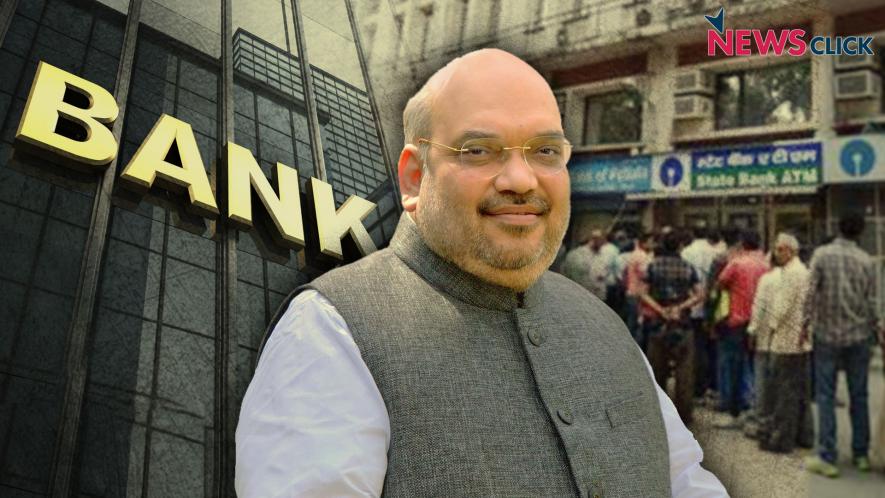The Curious Case of An Ahmedabad Bank and Amit Shah

neOn 22 June, a news agency (IANS) put out a story saying an RTI enquiry had revealed that an Ahmedabad bank had received Rs.745.59 crore worth of demonetised notes between 9 and 14 November 2016. The significance of this trivial sounding fact is that BJP president Amit Shah is a director of the bank.
The bank in question is the Ahmedabad District Cooperative Bank Ltd. (ADCB), located in Ahmedabad.
The revelation created a storm of sorts with several news portals first putting out the story and then withdrawing it for unknown reasons. The main opposition party, the Congress jumped in alleging malfeasance and complicity of Shah in this.
Later in the day, NABARD, a govt. body that looks after cooperative banks, issued a formal statementpooh-poohing the RTI revelations saying that everything was fine with the Ahmedabad bank’s procedures and dealings with the deposit of demonetised notes.
Prime Minister Narendra Modi had announced the withdrawal of all Rs.500 and Rs.1000 denomination currency notes on the night of 8 November 2016. This sudden withdrawal of about 86% of the currency in circulation at the time left the whole country in turmoil for months, as people struggled to exchange the old notes with new ones, spending hours in queues at banks. As it turned out, the announced purpose of demonetisation – that it will unearth black money – was not fulfilled because 99% of the old currency was deposited with the banks.
In this context, the deposit of a large amount of money in a small cooperative bank certainly sounds suspicious. Curiously, the RTI response and the subsequent NABARD clarification has raised more questions rather than provide answers.
1. The govt. had declared that it will chase down and investigate all those people who had deposited huge sums during demonetisation. In August 2017, it was reportedthat 5.56 lakh such people were identified under the second phase of ‘Operation Clean Money’ as it was dubbed. In phase 1, just over 1 lakh people with suspiciously large deposits were identified. The identified persons had not been able to provide explanations of where they got their cash from.
Question: Did the IT department or any other agency check out the people who made large deposits at ADCB?
2. NABARD has claimed that it “conducted 100 % verification in Ahmedabad DCCB which revealed that the bank had complied with all the KYC Guidelines of the RBI while accepting the demonetised notes,” and that “the bank had also submitted the required Cash Transaction Reports (CTRs) and STRs to FIU-India wherever required.”
Question: If the huge deposits were flagged by ADCB and the report forwarded to RBI or to the Financial Intelligence Unit (FIU) of India then what enquiries were made by concerned authorities and of whom? What has happened to the enquiry reports?
3. NABARD has said that ADCB received deposits of over Rs.2.5 lakh from only 0.09% of its depositor base of 16 lakh. That means, 1440 account holders deposited amounts in excess of Rs.2.5 lakh each. Have all of them been tracked and investigated? Who are these people?
Within 5 days of the announcement deposits at district cooperative banks were banned because the govt. suspected that various guidelines were not being followed. But ADCB did brisk business in these five days, netting nearly Rs.746 crore. That’s almost one seventh of its total deposits of Rs.5050 crore as on 31 March 2017.
Did the ADCB depositors have some prior information that only a five-day window is available for using the cooperative bank for depositing old notes?
4. According to reports, by January 2018, some 2 lakh persons have been firmly identified as having deposited over Rs.20 lakh during demonetisation without proper explanation. This includes 70,000 persons who made deposits of Rs.50 lakh or more. The initial list was of 18 lakh people with suspicious deposits of Rs.5 lakh or more which got whittled down to 2 lakh through “investigation”.
Question: Did any of the ADCB depositors figure in this list? Or, did any depositor of ADCB make such deposits and not figure in this list?
Watch the Video: Who's Afraid of Amit Shah? Not IANS
Why are these questions necessary?
The reason is that with Amit Shah as one of the directors, ADCB could have been compromised. Shah is a powerful person with direct confidence of the Prime Minister. He may have been privy to information about demonetisation or subsequent flurry of changes in orders regarding procedures. It would be ethical and, satisfy the people of country, if all the questions are clarified. After all the people of the country suffered tremendously due to demonetisation. Jobs were lost, the labour force itself shrank, the economy slowed down as output plummeted, agricultural commodity prices crashed driving farmers to ruin, small enterprises faced shut down and people struggled to get some cash to just have two square meals a day. They also saw that no black money was unearthed, fake currency notes also didn’t stop circulating, terrorist activities also did not decline – all of which was claimed by the govt. as objectives of the notebandi exercise. Even the painful transition to cashless or “less cash” transactions has not happened. So, people want to know if political connections were used to convert black money to w
Get the latest reports & analysis with people's perspective on Protests, movements & deep analytical videos, discussions of the current affairs in your Telegram app. Subscribe to NewsClick's Telegram channel & get Real-Time updates on stories, as they get published on our website.























